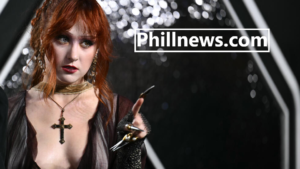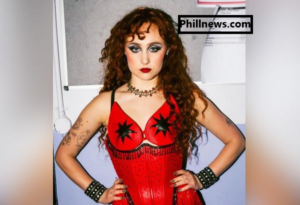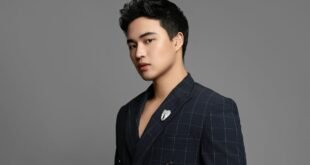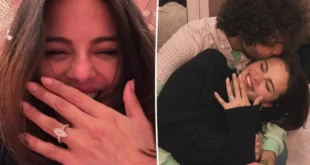Chappell Roan Axes Gigs After Backlash Over US Election Stance: A Deep Dive Into The Incident
Introduction
Chappell Roan, a popular pop artist who embraced bold and unique sound also does not shy away from saying it as she saw it when it came to the US election of 2020. Due to a lot of protests from some segments of her fans, Roan was left with no option but to pull out of several of her shows. Its occurrence has led to a myriad of discussions, which brought into question the issue of using music as a form of activism and the limitations artists put on themselves when conveying political messages. This article looks at looking at the details of the controversy including its effects and its ramifications for artists and their fans.
Who is Chappell Roan?
Chappell Roan previously known by her birth name Kayleigh Rose Amstutz is a pop-oriented singer-songwriter from America. She hails from Missouri and came into the limelight first with her raw and deeply personal track called “Good Hurt” back in 2017. Lyrical content is common in her songs, therefore; she sings about the strength she possesses, her weaknesses, and the truths many people hold close to their hearts—a factor that has endeared her to her fan base. Chappell Roan is the name of her family, more specifically her late grandfather, which reflects her name and her brand.
Roan has established himself as an ‘internet troll/pop music/minimalist hip-hop, independent artist. She weaves her experience with the struggle of everyday people, and significant social issues such as the rights of gay people, people with mental health issues, and gender equality of women. Her approach to these subjects engages the viewers as well as critics earning her plaudits but it also puts her in a tight spot when it comes to culture and politics.
The Incident: A Timeline of Events
The incite first arose when a known influencer, Chappell Roan, posted to her Instagram stories several links to the US elections and encouraged her followers to vote for a specific candidate as well as stand against what she regards as a threat to democracy. These were blunt and sometimes even aggressive which I am used to seeing from her as she is quite raw and unapologetic.
Nevertheless, Roan’s intention to make a political statement was not well received by everyone. A day after the two posts had been published on the two respective accounts, Roan started receiving backlash from a certain element of her followers and social media users. Most pundits criticized that her messages made people with different political leanings feel uncomfortable. The organization gained popularity and when things turned against it Roan received threats and obscene materials on the Web. The strain grew to weigh, and to a certain extent, some people boycotted her songs and even despised her perceived political consciousness.
For this reason, in defense, Roan posted a message on her social media platforms indicating she would no longer be featuring in some of the shows she was supposed to perform in the future. Roan said the move was not taken without careful consideration but was to protect herself from further harm. She said that such treatment affected her in a wrong way, and she needed some time off.”
Why Did the Backlash Happen?
To understand why Chappell Roan expected such a reaction we have to remember the current climate in the United States. Several factors have however emerged within the recent past that have led to political system polarizing. Topics like the right to vote, justice, or the principle of equal treatment have become topics that may cause public emotions to boil over. When they speak on any of such issues, they are likely to lose some of their audience in the process.
Chappell Roan also penned some posts that many people would quickly point to be highly partisan, which is never good for a public figure. Musicians fall into the gray area where, occasionally, they are performers, and many a time they enter the realm of shaping opinion. The fact of such a dual function may become a big problem, especially when they start to share their views that are not very congruent with the views of the audience.
It must be acknowledged, though, that Roan went above and above in her support of her chosen candidate, coming off to some listeners as hostile. The pushback may also be seen as a component of a broader effort to portray artists as “either politically neutral or as the leaders of a specific viewpoint.” Artists like Roan find themselves in a difficult position because of this expectation, which forces them to either distance themselves from or associate with the ideals that the public finds acceptable.
The Challenges of Mixing Art with Politics
Chappell The Roan incident is a prime illustration of how artists who support politics risk facing harsh repercussions. It is well known that musicians have always taken sides in politics, frequently using their music to support or oppose particular causes or ideologies. The question of whether or not musicians should be politically active is not something that recently emerged in modern society.
The Dixie Chicks, an American music group that even changed their name to The Chicks in 2003, are likely one of the most well-known instances. They experienced a tremendous reaction after speaking out against the then-President George W. Bush. They saw a sharp decline in sales, protests, and the removal of their songs from radio stations’ playlists. However, more contemporary artists like Billie Eilish and Taylor Swift have also brought up political concerns while still accepting the opinions of their followers.
Chappell Roan also emphasized that she made the sole personal option to speak out regarding the US election. She spoke up in an attempt to defend what she thought was correct, but the criticism highlighted the difficulties in doing so. Audiences have a type of personal bond with entertainers, whether they be musicians or others, and feel betrayed if their favorite artist takes a different political stand.
Chappell Roan also emphasized that she made the sole personal option to speak out regarding the US election. She spoke up in an attempt to defend what she thought was correct, but the criticism highlighted the difficulties in doing so. Audiences have a type of personal bond with entertainers, whether they be musicians or others, and feel betrayed if their favorite artist takes a different political stand.
Mental Health and Public Scrutiny
The effects of this circumstance on Chappell Roan’s mental health are another important factor. The demands of public scrutiny, especially when it becomes hostile, can be too much to bear. Although it is expected of artists to take criticism well, the ferocity of blowback in the social media age may be quite harmful.
Part of the reason Roan decided to postpone her performances was to save her mental health. She discussed how the unfavorable responses had affected her in her statement and stressed the significance of putting her health first. Discussions on the stress and mental health of prominent figures have been triggered by this decision.
Reactions to Roan’s choice to cancel have been varied. While some fans voiced their regret over the postponed events, a large number of others offered sympathy and encouragement, emphasizing the need to take care of oneself. The episode has also sparked a larger conversation about the need to show compassion for artists, who are still people with personal issues despite their notoriety.
The Role of Fans and Expectation of Neutrality
An artist’s career depends heavily on their fan base, which gives them the encouragement they need to be successful. But the connection between fans and artists may be complicated, especially when it comes to political neutrality requirements.
A lot of fans look to musicians to act as a sort of emotional blank canvas—someone they can pour their feelings onto without having political convictions get in the way. Some people believe that an artist’s political views should upend this romanticized partnership. Artists who feel strongly about social concerns, like Chappell Roan, are particularly challenged by this expectation.
However, the goal of art itself is sometimes at odds with the notion of impartiality. Throughout history, art has served as a vehicle for social critique and reform. From Beyoncé’s contemporary anthems about racial and gender equality to Bob Dylan’s protest songs from the 1960s, music has always been entwined with the political and cultural zeitgeist. Being impartial just doesn’t fit with the roles that artists play as social observers and critics, for many of them.
Censorship, Authenticity, and Artistic Freedom
The criticism Chappell Roan received also touches on the subjects of artistic freedom and censorship. Due to pressure and animosity from her critics, Roan decided to cancel her engagements, thereby silencing herself. This begs the question of how free artists are to express themselves, particularly in light of the potential consequences to their finances and professional opportunities.
The idea of authenticity is also highlighted by the dispute. The foundation of Roan’s career has been her genuineness, or her capacity to elicit strong emotional responses and honest connections from audiences. Her choice to voice her opinions about the election was in line with the principles she has consistently upheld in both her public image and music. The criticism, however, seems to indicate that some admirers only found her genuineness meaningful when it coincided with their worldview.
Artists frequently wrestle with this conflict between staying true to themselves and meeting the expectations of the audience. Authenticity requires taking chances, and occasionally such risks result in backlash and estrangement. Chappell Roan’s sincerity was a subject of debate in this instance as well as one of her strengths.
Implications for the Music Industry
The Chappell Roan case is representative of a larger trend in the music business, where musicians are becoming more outspoken about their political views. Social media’s explosion has been a major factor in this, giving artists a direct forum to express their opinions. But there are risks associated with this openness as well; artists who wish to voice their thoughts should be ready for possible criticism.
The extent to which musicians should get involved in politics has long been a topic of debate in the music business. A worry that political pronouncements may cost them money and fans has led some managers and companies to counsel musicians against taking a position, while others urge artists to do so to engage with audiences. In Chappell Roan’s instance, speaking up was a personal choice that eventually had an impact on her career.
 Phill News Entertainment – Phill News
Phill News Entertainment – Phill News






